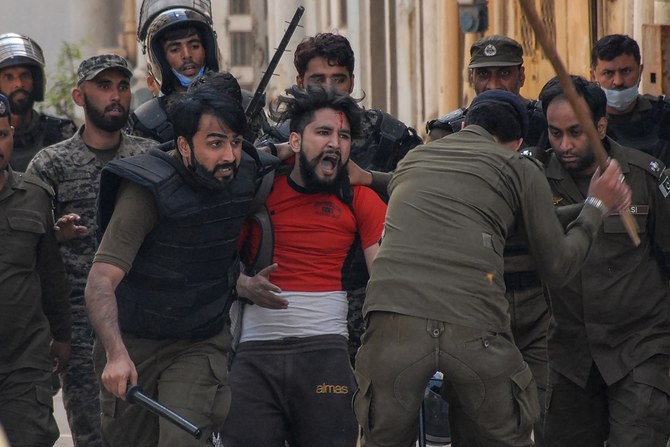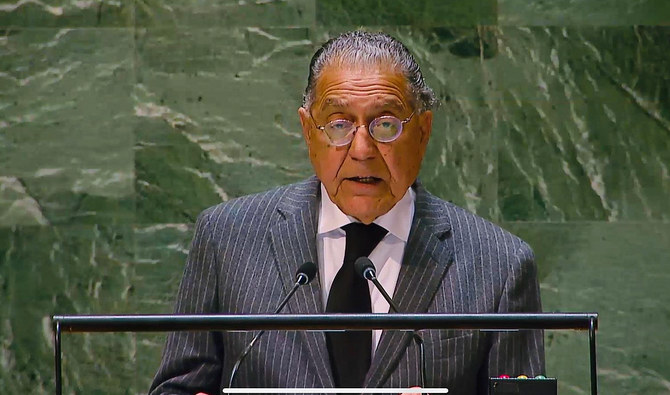ISLAMABAD/KARACHI – The Pakistan government on Wednesday said it had sent a proposal to the federal cabinet to impose a ban on the Tehreek-e-Labaik Pakistan (TLP) religious party for killing two policemen, attacking law enforcement forces and disrupting public life through nationwide protests.
Demonstrations erupted in major Pakistani cities and quickly turned violent after Saad Rizvi, the head of the TLP, was arrested on Monday.
Addressing a press conference, interior minister Sheikh Rashid Ahmed said protesters had killed two policemen and injured another 340 during violent attacks on law enforcement forces.
“We have decided to slap a ban on the TLP,” he said. “A file [for the purpose] is being dispatched to the federal cabinet for formal approval.”
“The police personnel who were kidnapped [by the protesters] have also reached back to their respective police stations,” he said, adding that demonstrators had blocked ambulances and obstructed oxygen supply to the hospitals as a third wave of the coronavirus swept through the country.
The minister also ruled out negotiations with the protesters and said their demands would not be met.
On Sunday, a day before his arrest, TLP chief Rizvi had threatened the government with protests if it did not expel France’s envoy to Islamabad over blasphemous caricatures of Prophet Muhammad (peace be upon him). Rizvi had called on the government to honor what he said was a commitment made to his party in February to expel the French envoy before April 20 over the publication in France of depictions of the Prophet (pbuh), which has enraged Muslims around the world.
The government of Prime Minister Imran Khan says it had only committed to debating the matter in parliament.
The interior minister congratulated law enforcement officials for clearing all blocked roads including motorways in eight to ten hours.
“They [the protesters] were well prepared and wanted to reach Islamabad at any cost,” Ahmed said, adding that the government had tried its best to resolve the issue through negotiations, but failed to convince TLP leaders.
“We are banning them not for any political reason, but due to their character,” he said, adding that if the government met the TLP’s demands, it would send the world a signal that Pakistan was an ‘extremist state.’
Earlier in the day, the interior minister had said while chairing a meeting to review the violence: “The writ of the state must be ensured at any cost.”
Law minister and spokesperson for the Sindh government, Murtaza Waha, said 254 people had been arrested and detained in the province since Monday.
“254 have been arrested and detained whereas 15 FIRs [police reports] have been registered,” he told Arab News.
PAKISTANI TALIBAN COME OUT IN TLP SUPPORT
Meanwhile, the Pakistani Taliban came out in support for TLP protesters, congratulating them for putting up resistance against security forces.
“[We] pay them [TLP] tribute for their courage and showing the military organizations their place,” the Taliban said in a statement. “We assure them that we will make them (government) accountable for every drop of the martyrs’ blood,” they added, referring to TLP claims that its supporters had been killed in clashes with authorities.
The Pakistani Taliban, a different entity from the Afghan Taliban and fighting to overthrow the Pakistan government, are an umbrella of militant groups called Tehrik-e-Taliban Pakistan (TTP), which has broken into many divisions.
Designated a terrorist group by the United States, the TTP has been in disarray in recent years, especially after several of its top leaders were killed by US drone strikes on both sides of the Pakistan-Afghanistan border, forcing its members into shelter in Afghanistan, or fleeing to urban Pakistan.
“We want to remind them [TLP] that this government and security institutions are always untrustworthy, breachers of promise and liars so they should not be trusted and military effort is the only solution to this problem,” the Taliban statement said.
In a press conference on Tuesday evening, science and technology minister Chaudhry Fawad Hussain had said “no group or party must even think of dictating the government or the state … If a state allows this, then it will disintegrate and there will be chaos.”
In a statement released on Tuesday afternoon, TLP told the government: “You will have to expel the French ambassador under all costs … The country will remain jammed until the French ambassador is expelled.”
In a separate statement, TLP said its protests would go on until Rizvi was released.
ARMED PROTESTERS
On Tuesday, the government of Punjab said troops of Pakistan Rangers (Punjab) were “required with immediate effect till the request of de-requisition.”
Rangers were deployed in the cities of Rahim Yar Khan, Sheikhupura, Chakwal and Gujranwala, the circular said.
Lahore police spokesperson Rana Arif told the daily Dawn newspaper protesters had beaten a police constable to death in Lahore’s Shahdara area on Tuesday, as a result of which a police case had been registered against TLP leaders and supporters. Police have also registered a case against Rizvi on terrorism and other charges, Arif said.
“Over 300 policemen in Punjab, including 97 in Lahore, had sustained injuries, many of them seriously, after violent protesters attacked them with clubs, bricks and firearms,” Dawn reported. “The Gujrat district police officer and Kharian Deputy superintendent of police were among the injured.”
“Hundreds of protesters and policemen were injured and thousands of TLP activists and supporters were arrested and booked for attacking law enforcement personnel and blocking main roads and highways,” Dawn added, saying four people, including a policeman, had been killed.
Police said four policemen had been shot by armed TLP protesters, and the use of firearms by demonstrators had taken law enforcement agencies by surprise.
“In Lahore alone, four policemen were shot at and injured by the armed men of the TLP in the Shahpur Kanjran area. Similarly, two police constables were shot at and injured in Faisalabad,” Dawn reported, adding:
“Two video clips from Lahore in this regard showed policemen, Imran and Aslam, being rushed to a hospital with bullet wounds. In another video clip, an on-duty policeman was seen calling for help to dispatch more force, saying they had come under armed attack by the protesters in Shahpur Kanjran.”
“The TLP armed men opened straight fire on the police and our four constables were injured,” Lahore DIG (operations) Sajid Kiani told reporters on Tuesday evening.
Under a standing order, he said, police had been deployed unarmed and allowed only to use anti-riot gear against protesters. “But it shocked us that the TLP men used guns against the anti-riot force,” Kiani said.
Giving one example, Kiani said when police reached Shahpur Kanjran to clear the national highway, announcements were made in nearby mosques urging TLP followers to take on police.
“Within 10 minutes, some 200 people joined those already present and attacked police,” he said, adding that Lahore police had lodged 19 cases against protesters and cleared the areas of Shahdara, Imamia Colony, Thokar Niaz Baig, Babu Sabu and some parts of Ring Road by Tuesday evening.
Police also conducted an operation in the Chungi Amar Sidhu area to rescue Model Town SP (operations) Dost Mohammad Khosa and five other policemen from protesters holding them hostage at a power grid station.
The Shahdra and Thokhar areas of Lahore also turned into battlefields after hundreds of TLP supporters took several policemen hostage.
In Shahdara, a constable died due to severe head and chest injuries after protesters tortured him with clubs, police said.
Police said TLP activists had occupied and blocked 22 main roads, intersections and areas of Lahore, while reports of violence had also come from Faisalabad, Sheikhupura, Rahim Yar Khan, Sahiwal and Gujrat.
Reports from other parts of Punjab suggested TLP supporters had occupied over 100 points, roads and major intersections of various cities of the province.
Over 1,400 activists of the TLP have been arrested across Punjab, Punjab police spokesperson told Dawn, saying Punjab police had launched major operations, cleared nearly 60 roads and areas, and registered multiple police cases against supporters, representatives and leaders of the TLP.
Speaking to Arab News, Muhammad Ali, a spokesperson of the TLP in Karachi, said at least six workers of the party had died and a large number were wounded due to firing by law enforcement agencies. Hospital and rescue sources only confirmed two deaths.
In a statement released on Tuesday, TLP said seven of its supporters had been killed in police firing, but the figures could not be independently verified.
HISTORY OF PROTESTS
Saad Rizvi became the leader of the Tehreek-e-Labiak Pakistan party in November last year after the sudden death of his father, Khadim Hussein Rizvi.
Tehreek-e-Labiak and other religious parties denounced French President Emmanuel Macron since October last year, saying he tried to defend caricatures of the Prophet Muhammad (pbuh) as freedom of expression.
Macron’s comments came after a young Muslim beheaded a French school teacher who had shown caricatures of the Prophet Muhammad (pbuh) in class. The images had been republished by the satirical magazine Charlie Hebdo to mark the opening of the trial over the deadly 2015 attack against the publication for the original caricatures. That enraged many Muslims in Pakistan and elsewhere who believe those depictions are blasphemous.
Rizvi’s party gained prominence in Pakistan’s 2018 federal elections, campaigning to defend the country’s blasphemy law, which calls for the death penalty for anyone who insults Islam. It also has a history of staging protests and sit-ins to pressure the government to accept its demands.
In November 2017, Rizvi’s followers staged a 21-day protest and sit-in after a reference to the sanctity of the Prophet Muhammad (pbuh) was removed from the text of a government form.
















